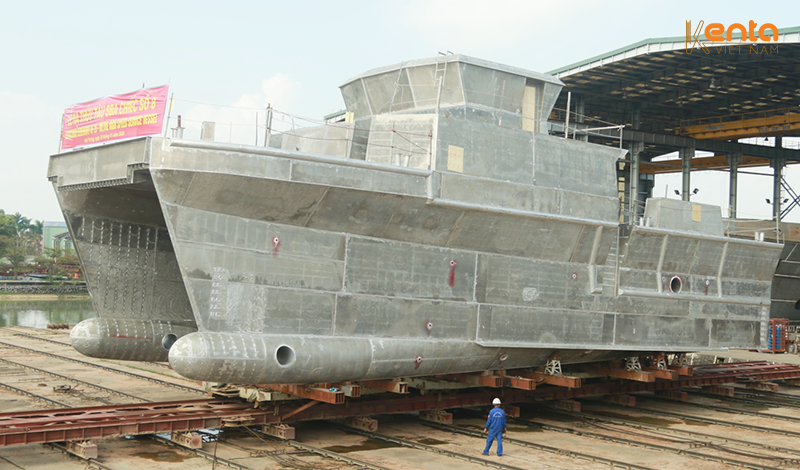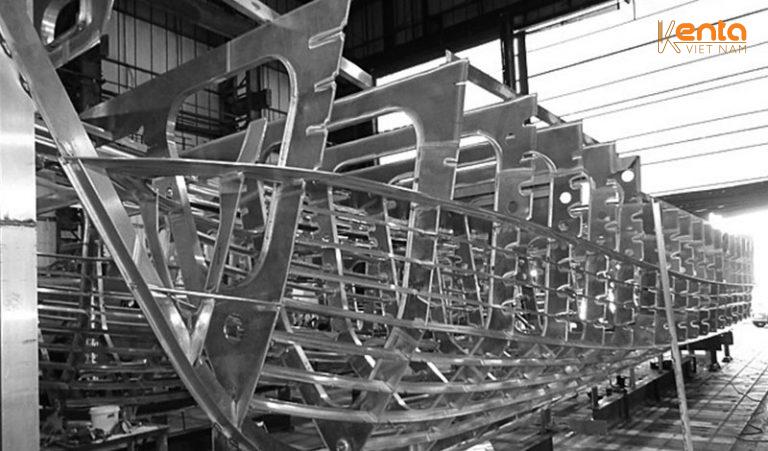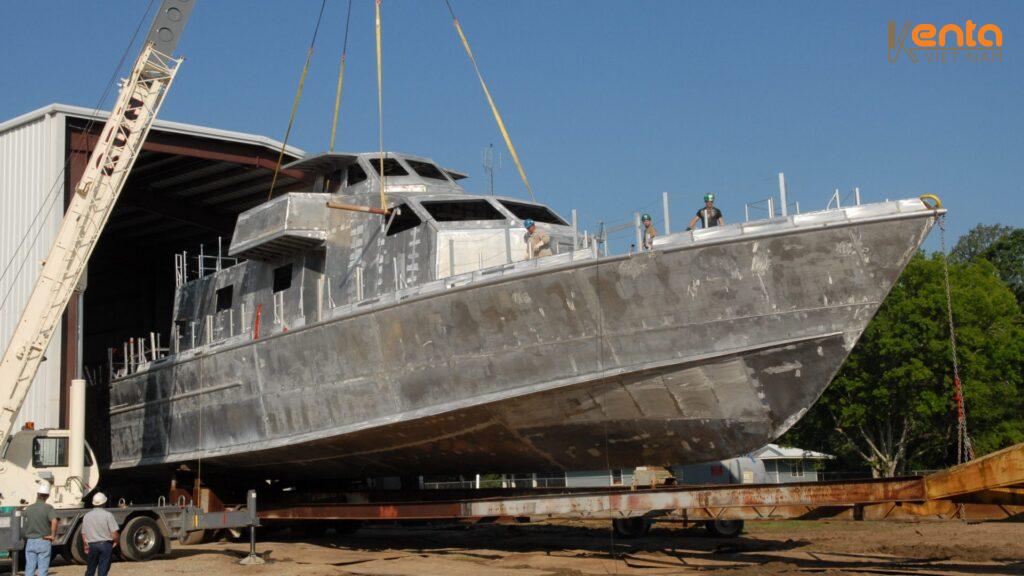Knowledge, Technology
Is aluminum plate used for ships durable?
In the modern shipbuilding industry, aluminum plates are increasingly used and considered an optimal material choice to replace steel in many parts of ships. However, a common question arises: Is aluminum plate used for ships durable? Because the sea is a harsh environment—where humidity, salt, wind, and pressure frequently act directly on the materials.
Aluminum plate and usage trends in the maritime industry
For decades, steel has been the traditional material for shipbuilding. But the biggest drawback of steel is that it easily rusts when exposed to seawater for a long time. To overcome this, the shipbuilding industry gradually shifted to using aluminum alloy plate—a type of material that is lightweight, highly corrosion-resistant, and easy to process.
Aluminum plates are not only about 30–50% lighter than steel but also do not rust, helping extend equipment lifespan and reduce maintenance costs. Especially in patrol boats, high-speed vessels, canoes, fishing boats, or modern cruise ships, aluminum has almost become the main material for constructing hulls, decks, flooring, or cabins.
So, is aluminum plate used for ships durable?
Superior corrosion resistance is one of the key features that ensure the durability of aluminum plates in a marine environment, thanks to natural corrosion resistance. When exposed to air or water, the aluminum surface forms a thin oxide layer (Al₂O₃) that acts like armor protecting against oxidation and corrosive agents.

Especially, aluminum alloys used in maritime applications such as 5052, 5083, and 5086 have high magnesium content, which enhances resistance to salt, acid, and alkali. This is extremely important in seawater environments where most other metal materials quickly corrode.
High tensile strength and hardness, not only resisting rust well, the types of aluminum plates used for ships also possess high mechanical strength, suitable for both the ship's load-bearing hull and frequently stressed decks. Among them, aluminum 5083 is one of the materials with outstanding tensile strength, up to 275 MPa, even increasing further after heat treatment.
Combined with good elasticity, aluminum plates can withstand wave impacts and torsional forces from the hull without deforming or cracking like some other materials. This explains why high-speed patrol boats or marine service vessels prefer aluminum over steel.
Lightweight – Increases performance and saves fuel. The weight of a ship is a crucial factor affecting speed, load capacity, and fuel consumption. Therefore, when using aluminum plate that is up to 1/3 lighter than steel, the ship’s total weight is significantly reduced, helping the vessel accelerate faster and save operating costs.
Especially in high-speed cargo ships, passenger ships, or cruise vessels, reducing load using aluminum plates improves operational efficiency and optimizes engine performance.
Good weldability and easy construction. The aluminum alloys used in maritime are not only durable but also easy to fabricate thanks to good TIG, MIG welding capabilities and ease of cutting. This helps shorten the manufacturing, repair, and processing time of the ship. Welds made with aluminum, when properly treated, have very high strength, ensuring a secure connection between parts of the hull.

In particular, with aluminum grades like 5083 and 5052, welding and shaping techniques are widely applied without affecting the overall quality of the structure.
Long lifespan, low maintenance costs. Thanks to superior physical and chemical properties, parts made from aluminum plates on ships have an average lifespan of 20 to 30 years, even longer with regular maintenance. Unlike steel, aluminum does not require complicated anti-rust painting, saving considerable costs for coating, cleaning, and replacement of components during use.
For maritime transport companies, this advantage offers clear financial benefits, especially when operating over long periods with high frequency.
Common types of aluminum plates used in shipbuilding
Among many aluminum grades, three are considered the most suitable for the marine environment:
Aluminum plate 5052,This aluminum alloy type has good durability, is easy to weld, and has high corrosion resistance. It is often used to manufacture ship decks, ship doors, equipment mounting bases, or ship interior partitions.
Aluminum plate 5083 is a leading material in the modern shipbuilding industry due to its superior tensile strength, excellent corrosion resistance, and very good load-bearing capacity. Aluminum 5083 is widely used for the hull, deck, compartments, and main structures of high-speed or ocean-going ships.
Aluminum plate 5086 is the optimal choice for ships operating for long periods at sea or in direct contact with saltwater. It has higher strength than 5052 but is easier to weld than 5083. It is commonly applied in building fishing boat hulls, lifeboats, or floating equipment parts.
So can aluminum plates completely replace steel?
In fact, aluminum cannot completely replace steel in all parts of a ship—especially for large-load ships that require super-strong structures like shafts and super-thick hulls. However, in the segment of medium and small ships, high-speed boats, or cruise ships, aluminum is gradually gaining an advantage and becoming the main material thanks to its light weight, durability, and convenient fabrication.
Combining aluminum and steel in shipbuilding is also a current trend, helping to maximize the advantages of each material type.
Aluminum plates for shipbuilding – Durable material with long-lasting efficiency
Therefore, if you are wondering whether aluminum plates used for shipbuilding are durable, the answer is: Very durable—if you choose the right aluminum grade and the right supplier.
Kenta VietNam is a unit specializing in supplying internationally standard 5052, 5083, and 5086 aluminum plates, complete with CO-CQ, ready to cut to required sizes, and deliver nationwide. With practical experience in supplying materials for constructing ship decks, machine bases, cabins, and marine industrial equipment, we commit to accompanying you from the material selection stage to project completion.




















